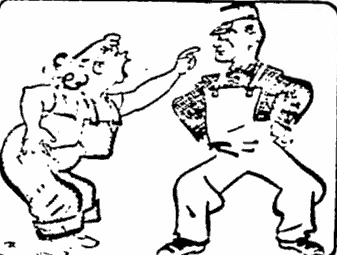Japanese send more soldiers to Philippines
Reinforcements arrive in preparation for big Bataan attack
….
Reinforcements arrive in preparation for big Bataan attack
….
Washington, March 25 (RNS) –
The appointment of 993 additional chaplains has been authorized by the War Department, it was announced here.
The new chaplains will be called to active duty as the need arises.
Campaign for union curbs partly organized, he asserts
……
By Maxine Garrison
In England, men have mustered a movement against the hypothetical dominance of women in the post-war world.
In this country, the men in at least one industrial plant have promised to strike if women, being brought in for the duration, are paid wages as high as those now customary for the work.
A Los Angeles woman commander of a volunteer group, demoted because of “pink tea” activities, walked out entirely, taking her gang with her, and is organizing a rival group in protest against the “totalitarian rule” which ordered her demotion.
…Thus blow the straws of the wind.
If I may say so, this is one heck of a time for the battle of the sexes to break out with a vigor not seen since the days of the original “Bloomer Girls.”

To have war raging in a vast Pacific and Far East theater, throughout Europe and part of Africa, and across the Atlantic to American coastal waters was not enough for these strange peoples of the middle 20th century.
‘They began to squabble’
In the midst of the great war effort toward one common goal, they began to squabble among themselves. One group in its rivalry with another chose to impede the work of that other, rather than shelve its own immediate selfish considerations in the interests of survival.
One of the most curious of these internal festerings was the feud which arose between the sexes, even while individual romance and marriage flourished as usual, if not with increased fervor.
Men knew that women would have to take over men’s jobs at home for a while. But they feared that if women received equal salaries, it would be an insult to themselves (It might be noted, in passing, how strange it was they did not realize that for women to be paid less for the same work would tend to bring down men’s salaries down, too).
Men knew, too, that women had the same concern as themselves in the outcome of the war, and were willing to shoulder any necessary burden. Yet they were afraid that women might measure up too well, and seemed more anxious to keep power from falling into feminine hands than to accept the help women offered.

Like study clubs
Many women, in turn, were wont to carry on war work with the same methods and manners they had used for bridge parties and literature study clubs. According to contemporary reports, they acted as if the whole war were a show being put on or their special benefit, to give them a chance to act important. They were willing to forego the real benefits in favor of private bickering.
Of this period, it may be said:
They could not see the forest of the ultimate good of civilization for the trees of individual selfishness and personal glory.
…At this point, no one can predict just what the historian would add – whether the petty feuds were forgotten in favor of the best interests of the whole people, or whether they bogged down the national effort, seriously hampering it.
That final sentence is up to us, and it’s high time we made up our minds which we prefer.
U.S. War Department (March 26, 1942)
Philippine theater.
The War Department will announce in General Orders that the President has awarded, in the name of Congress, the Congressional Medal of Honor to General Douglas MacArthur for conspicuous gallantry and intrepidity, above and beyond the call of duty, in action in the Philippines against invading Japanese forces. The announcement of the award was made today in a radiogram sent to Maj. Gen. Richard K. Sutherland, Chief of Staff, United States Army Forces in Australia. The President directed that the presentation of the medal be made, in his name, to Gen. MacArthur by the United States Minister to Australia.
The citation accompanying the award is as follows:
General Douglas MacArthur, Commanding General, United States Army Forces in the Far East, for conspicuous leadership in preparing the Philippine Islands to resist conquest, for gallantry and intrepidity above and beyond the call of duty in action against invading Japanese forces, and for the heroic conduct of defensive and offensive operations on the Bataan Peninsula. He mobilized, trained, and led an army which has received world acclaim for its gallant defense against a tremendous superiority of enemy forces in men and arms. His utter disregard of personal danger under heavy fire and aerial bombardment, his calm judgment in each crisis, inspired his troops, galvanized the spirit of resistance of the Filipino people, and confirmed the faith of the American people in their Armed Forces.
There is nothing to report from other areas.
Philippine theater.
The fortified islands at the entrance to Manila Bay were again subjected to heavy aerial bombardment by the enemy. 54 heavy Japanese bombers participated in the attack which continued for six hours. Most of the bombing was concentrated on Corregidor. Damage to military installations was slight and our troops suffered only a few casualties. Four enemy planes were shot down by our anti-aircraft artillery.
In Bataan, there were sharp skirmishes between patrols along the entire front.
There is nothing to report from other areas.
U.S. Navy Department (March 26, 1942)
Caribbean area.
The U.S. Coast Guard cutter Acacia was shelled and sunk presumably by an enemy submarine, in the Caribbean area in March. The Acacia was a small unarmed ship of the tender class which was used to provide services to aids to navigation.
All personnel aboard the Acacia were rescued and there were no casualties.
There is nothing to report from other areas.
The Pittsburgh Press (March 26, 1942)
Free men will triumph in great crusade, general says
By Francis L. McCarthy, United Press staff writer
…
Chinese in trap, Allied situation serious
By Ned Russell, United Press staff writer
…
Washington, March 26 (UP) –
The 1,130-ton Coast Guard cutter Acacia, a small unarmed ship of the tender class, was shelled and sunk in the Caribbean area, a Navy communiqué announced today. The attacker was presumably an enemy submarine.
The Acacia was sunk some time this month, the Navy said, and all personnel aboard were rescued.
This was the 17th ship in the naval service to be lost by enemy action.
By Ted H. Maloy, United Press staff writer
…
Surprise raids paving way for attack on Nippon
By Sandor S. Klein, United Press staff writer
…